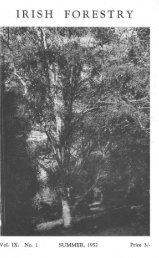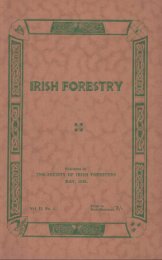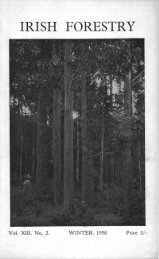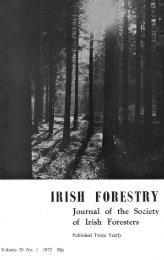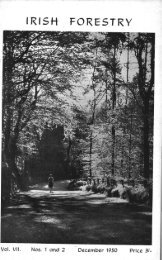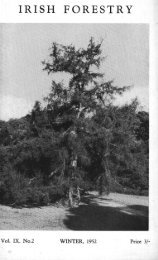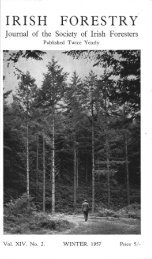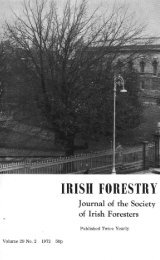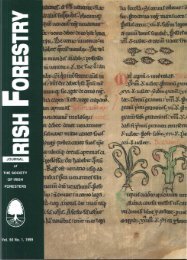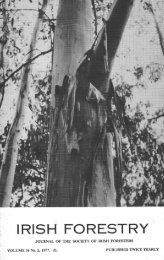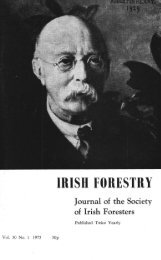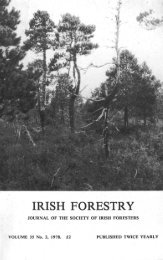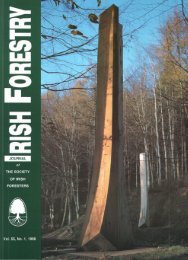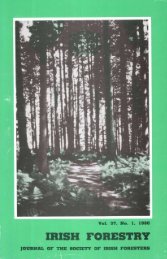Download Full PDF - 41.38 MB - The Society of Irish Foresters
Download Full PDF - 41.38 MB - The Society of Irish Foresters
Download Full PDF - 41.38 MB - The Society of Irish Foresters
You also want an ePaper? Increase the reach of your titles
YUMPU automatically turns print PDFs into web optimized ePapers that Google loves.
IRISH FORESTRY<br />
seconds. Eventually at any rate a preliminary selection was decided on. <strong>The</strong> dozen or so<br />
chosen for further consideration included several from various continental countries -in<br />
one case we paid the fare <strong>of</strong> a Norwegian to come to Dublin by air for interview.<br />
<strong>The</strong> man who impressed 'me most favourably was the only <strong>Irish</strong>man on the list: a genuine<br />
<strong>Irish</strong>man at that with an 0 name, hailing from Co. Limerick. In voting for him, I was in<br />
a minority <strong>of</strong> one. I may have been wrong because so far from blowing his own trumpet,<br />
he was <strong>of</strong> the self-depreciating type and may have been lacking in the drive necessary in<br />
a director whose main function was to be the reorganization and vitalizing <strong>of</strong> a service<br />
which up to then had been somewhat stagnant; but with the arguments used by the other<br />
selectors against him, I still do not agree. Most <strong>of</strong> this man's forestry career had been in<br />
India: consequently, they argued, he could know nothing <strong>of</strong> <strong>Irish</strong> forestry requirements.<br />
My answer was that he was therefore in no danger <strong>of</strong> starting with preconceived ideas -he<br />
would hardly be likely to advocate the growing <strong>of</strong> mahogany or teak in Ireland -whereas<br />
a man with experience in a country not altogether unlike Ireland might tend to favour<br />
practices unsuitable to our usually damp summers and mild winters. Moreover, I urged,<br />
Mr O'p. knows the <strong>Irish</strong> people, as well as the <strong>Irish</strong> climate, and this appears to me to be<br />
a prime essential in a Director <strong>of</strong> Forestry, since so much <strong>of</strong> the success <strong>of</strong> an ambitious<br />
afforestation programme depends on the acquisition <strong>of</strong> land from landowners who are<br />
far from forestry-minded and on creating enthusiasm in a staff hitherto accustomed to<br />
indifference almost amounting to defeatism. As I say, I was in a minority <strong>of</strong> one so there<br />
was no more to be said. I then concentrated on pushing my second choice, one Reinhardt,<br />
a German. Barton agreed with me in this; the others were undecided. As usually happens<br />
in a committee, when two or three members have decided views and the rest have not, the<br />
former carry the day. <strong>The</strong> result was that Reinhardt was appointed. He was, in fact, only<br />
a moderate success and when the War broke out in 1939, he returned to Germany and the<br />
senior permanent <strong>of</strong>ficial, a dour Scot called Dr Anderson, was automatically promoted<br />
to the directorship. After a while he resigned, only to be succeeded by another <strong>of</strong>ficial,<br />
again a Scot but not a dour one, an able after-dinner speaker who potters along awaiting<br />
his approaching civil service pension. I have hopes that the next director will be the young<br />
and energetic <strong>Irish</strong>man who now occupies the position <strong>of</strong> chief inspector.<br />
Taken from Appendix B, Changing Times - Ireland since 1898 by Edward MacLysaght.<br />
PubJished by Colin Symthe, Gerrards Cross, London. Reprinted here by kind permission<br />
<strong>of</strong> the MacLysaght family.<br />
Edward MacLysaght (1887-1986) was born in Somerset and educated in England.<br />
He came to Ireland in 1908 when his father bought a farm <strong>of</strong> 600 acres (240 ha) near<br />
Tuamgraney, Co Clare, half <strong>of</strong> which was leased to the Forest Service starting in 1926.<br />
He joined the Gaelic League, learned <strong>Irish</strong> and was nominated to an Industrial Resources<br />
Commission set up by the 1918 Dail. He was elected a member <strong>of</strong> the first Free State<br />
Senate.<br />
In 1939 he published <strong>Irish</strong> Life in the Seventeenth Century (revised and enlarged<br />
in 1950), an account <strong>of</strong> everyday social life at that period. He became an Inspector for<br />
the <strong>Irish</strong> Manuscripts Commission and joined the staff <strong>of</strong> the National Library in 1943.<br />
Later he became Chief Herald at the <strong>Irish</strong> Genealogical Office and in 1949 Keeper <strong>of</strong><br />
Manuscripts at the National Library. <strong>The</strong> culmination <strong>of</strong> his life's work came with the<br />
61



